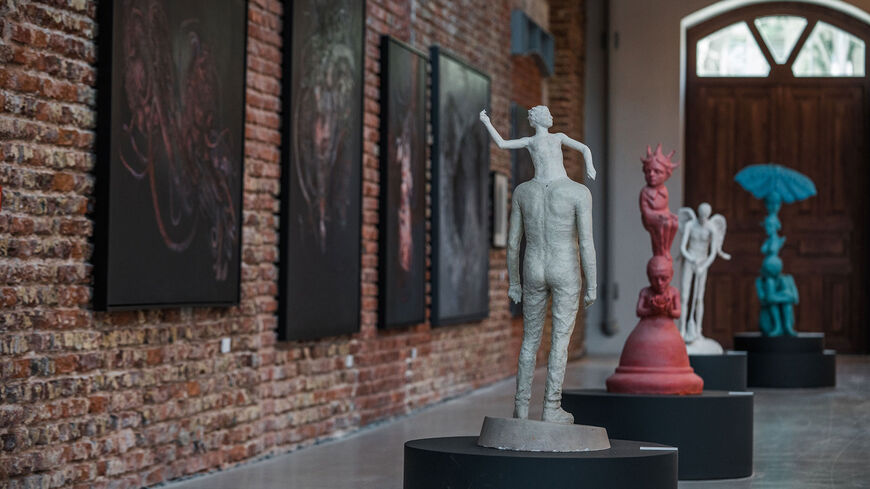IZMIR, Turkey — An art exhibition that brings together the works of top Turkish artists in a sumptuous 19th-century building in Istanbul has become the latest flare-up in Turkey’s culture wars, as an Islamist group and several Justice and Development Party (AKP) members urged its closure, saying that the works contain perversity and blasphemy.
The exhibition, called “Beginning From the Middle,” brings together from June 24-Aug. 30 some 400 works of art from the country’s most prominent — and most expensive — artists in Feshane, a former factory that used to make military gear and fes, or fez, the traditional red, flat-topped felt hat worn by men during the Ottoman era. The factory underwent a costly renovation over the last four years and reopened as an arts hub on June 23.
Mission Completed…#İBBMiras #Feshane pic.twitter.com/mghx5fghzW
— Mahir Polat (@mhrpolat) June 23, 2023
The inaugural exposition, whose title is inspired by a quote from French philosopher Gilles Deleuze, includes the works of Komet, the Paris-based Turkish painter of gloomy but dreamy scenes; Nes’e Erdok, known for her portraits of sad-looking strangers; and Murat Morova, who combines calligraphy and traditional motives with hauntingly modern words. Taner Ceylan, the leading Turkish artist known for his hyperrealist paintings that play around gender roles, also displays one of his best-known works, “Ingres," where he has superimposed the face of Jean-Auguste-Dominique Ingres on the French painter’s portrait of Princess de Broglie.
Mayor Ekrem Imamoglu, the opposition dynamo who snatched the city from the ruling party’s grip in the 2019 local polls, said at the opening that he aimed to turn many of the abandoned places in the city into public spaces where art and culture could thrive. “The banks of Golden Horn will be covered with cultural, sportive and artistic venues,” he pledged.
But this might be easier said than done.
Feshane, which is located on the banks of the Golden Horn, is located in the Eyup district, which is a historically significant area — especially for Turkey's Muslims — due to the presence of the tomb of Abu Ayyub al-Ansari, the close companion of the Prophet Muhammad. The district mayors have been from Islamist parties since 1994 and from the ruling AKP since 2004.
Deniz Koken, the new mayor of the district, denounced the exhibition as an affront to national sensitivities. “Anyone who sets out with the claim of serving this city should not forget that they are obliged to respect the values and moral principles of our society. … We expect the Istanbul Municipality to understand the society's sensitivities and ensure that this moral line is not crossed,” he tweeted Tuesday.
Simultaneously with Koken’s statement, an angry group stormed toward the venue Tuesday afternoon, demanding that the artworks, which contained nudity, sex, homosexuality, blasphemy, pagan rituals and “hostility toward the police,” be taken down. The leader of the pack, Ozlem Dogan, the Ankara bureau chief of the arch-conservative newspaper Milat, had posted images of the works earlier, accusing the exhibit of providing a home to “all sorts of perversities, including pagan symbols, crossdressing and belly-dancing figures in front of a mosque.”
She expressly referred to Ceylan’s “Ingres” and a moving text on gender, identity and exclusion by queer artist Ekin Keser, whose sister was killed in the devastating earthquake in Turkey.
Bugün, CHP’li İBB’nin Feshane’deki skandal sergisini gezdim. Satanist semboller, LGBT propagandası, İngilizce mahyalı cami önünde dansözler, +18 tablolar, Polis düşmanlığı içeren fotoğraflar, devrim ve sosyalizm övgüsü. Kısacası her türlü fitne fücur bu sergide mevcut.👇🏻 pic.twitter.com/Ex02TXr5a2
— Özlem Doğan (@ozlemdogan_) June 25, 2023
Kursat Mican, the president of Alperen Hearths — a far-right youth group that adheres to Turkish nationalism with a mix of Sunni Islam — said that the exhibition must be removed immediately. “We warn Ekrem: Either he removes this exhibition or we as a nation know how to remove it,” he threatened.
Echoing some of the comments in the conservative press that targeted Imamoglu, the demonstrators said that the display of the artworks for everyone, including children, violated the Turkish Constitution’s articles 41 and 58 on the protection of family and youth.
The police dispersed the demonstrators, but the exhibit organizers announced that the exhibit would be closed during the four-day religious holidays in Turkey. Mahir Polat, the head of the Istanbul Municipality Culture and Restoration Department, said that the closure during the Eid al-Adha had been in the plans. However, several Istanbul-based journalists maintained that the closure had come after the protests, fearing that some of the daring artworks may become targets for zealots who’d come to the district for Eid prayers.
There have been previous attacks against nude or sexually provocative artwork in Istanbul. Often, organizers cover or remove the offending work rather than risk vandalism. But the protests over the Feshane exhibition are significant for two reasons. The first is the effort to polarize liberals and conservatives further ahead of the local elections next year and erode Imamoglu’s popularity among the conservatives who voted for him in the last polls.
Kemal Kilicdaroglu, the lame-duck leader of the opposition Republican People’s Party (CHP), said Imamoglu should run again for Istanbul. This is mainly because he knows that the CHP may lose the metropolis if it runs with another candidate, but also because he would like to keep the rising and narcissistic star of the CHP from aiming at the party’s top seat. On the other hand, Imamoglu, who has a legal case hanging over his head, may not run for a new term due to judicial reasons. The attack against Feshane aims to undermine Imamoglu’s recent work on culture, including launching a design center at the art nouveau Casa Botter.
The second reason is that the AKP — now in alliance with two radical Islamist parties — has been steadily increasing its anti-LGBTQ rhetoric. While local authorities and police cracked down on LGBTQ events throughout July, they ignored anti-LGBTQ groups’ attacks on members of civil society who wanted to hold small-scale events to mark Pride month. In the western town of Izmir, the bar association’s “Pride breakfast” was attacked by a group that claimed to be from a pro-family group. The police did not intervene.
Based on off-the-record remarks of an unnamed AKP deputy, Turkish media reported that the ruling party was preparing legal amendments that would ban LGBTQ associations, which are vocal and well-linked internationally. This was not officially confirmed. However, Mican, the leader of the Muslim nationalist Alperen Hearths, said last week that he submitted a petition of 150,000 signatures to the AKP last week to ban LGBTQ clubs, outlaw sex operations and “stop gay propaganda.”








